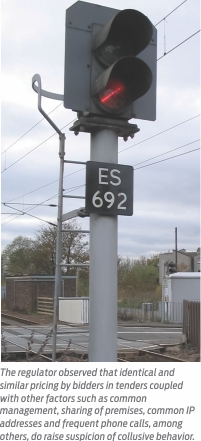The ruling came on a complaint filed by a North Western Railway official alleging that 37 entities had formed a cartel for supply of railway signaling cables and that they quoted high rates.
July 18, 2018
 The Competition Commission has rejected allegations of unfair business practices made against 37 railway signaling cable suppliers even as it noted that the scale of operations of Indian Railways requires an “efficient” procurement policy which is in tandem with competition laws. In a 49-page order, the watchdog said “no case of contravention” of competition norms has been found.
The Competition Commission has rejected allegations of unfair business practices made against 37 railway signaling cable suppliers even as it noted that the scale of operations of Indian Railways requires an “efficient” procurement policy which is in tandem with competition laws. In a 49-page order, the watchdog said “no case of contravention” of competition norms has been found.
There was no violation of Section 3 of the Competition Act that pertains to anti-competitive agreements, the CCI observed while disposing of the matter. The ruling came on a complaint filed by a North Western Railway official alleging that 37 entities had formed a cartel for supply of railway signaling cables and that they quoted high rates.
Investigations by the Director General (DG) — the probe arm of the regulator — found that 11 entities had violated competition norms but did not find any contravention by the remaining 26 entities. During the probe, the DG had classified the 11 entities into five subsets on the basis of various factors, including structural links and family relationships.
The subsets were — Paramount Wires and Cables and Paramount Communications; Tirupati Plastomatics and Kanhha Cables; Vindhya Telelinks and Birla Cable; Incom Cables and Incom Wires and Cables; and Myco Electricals, Continental Telepower Industries and Delhi Telecom.
The regulator observed that identical and similar pricing by bidders in tenders coupled with other factors such as common management, sharing of premises, common IP addresses and frequent phone calls, among others, do raise suspicion of collusive behavior between the bidders.
As per the regulator, neither there is any evidence of anti-competitive agreement or arrangement amongst five sub-sets of bidders nor any circumstantial evidence to establish tacit collusion in the present case. According to the regulator, owing to structural links and family relationships, among other factors, the five subsets of bidders had the opportunity to exchange information and coordinate their behavior.




